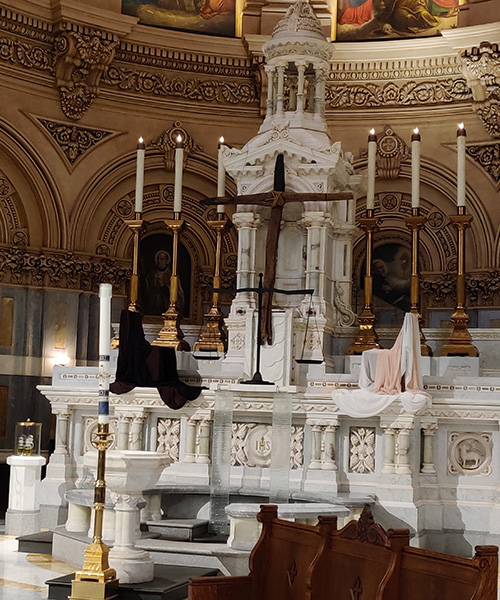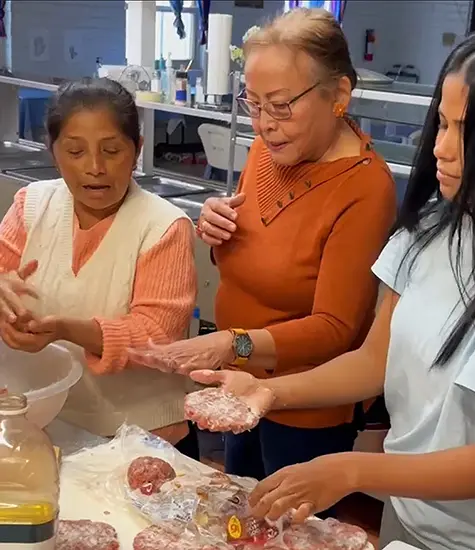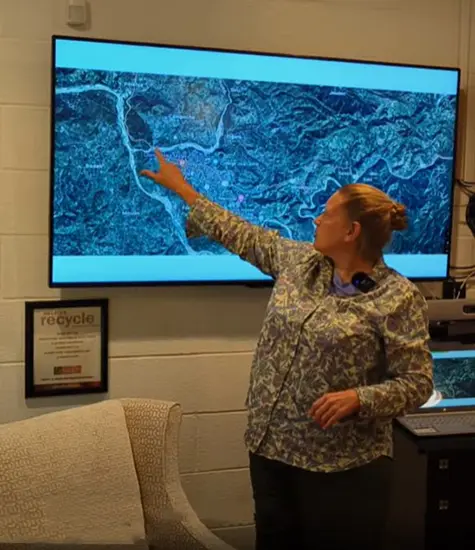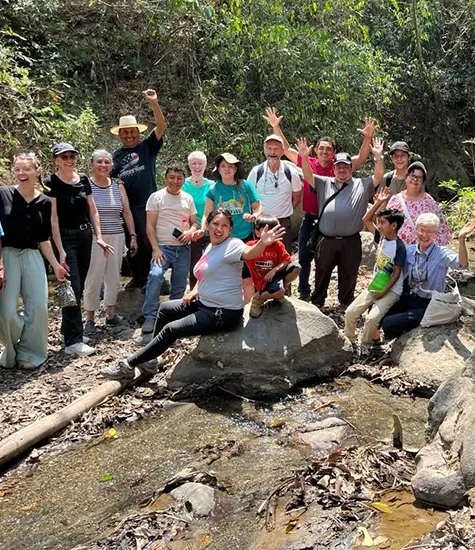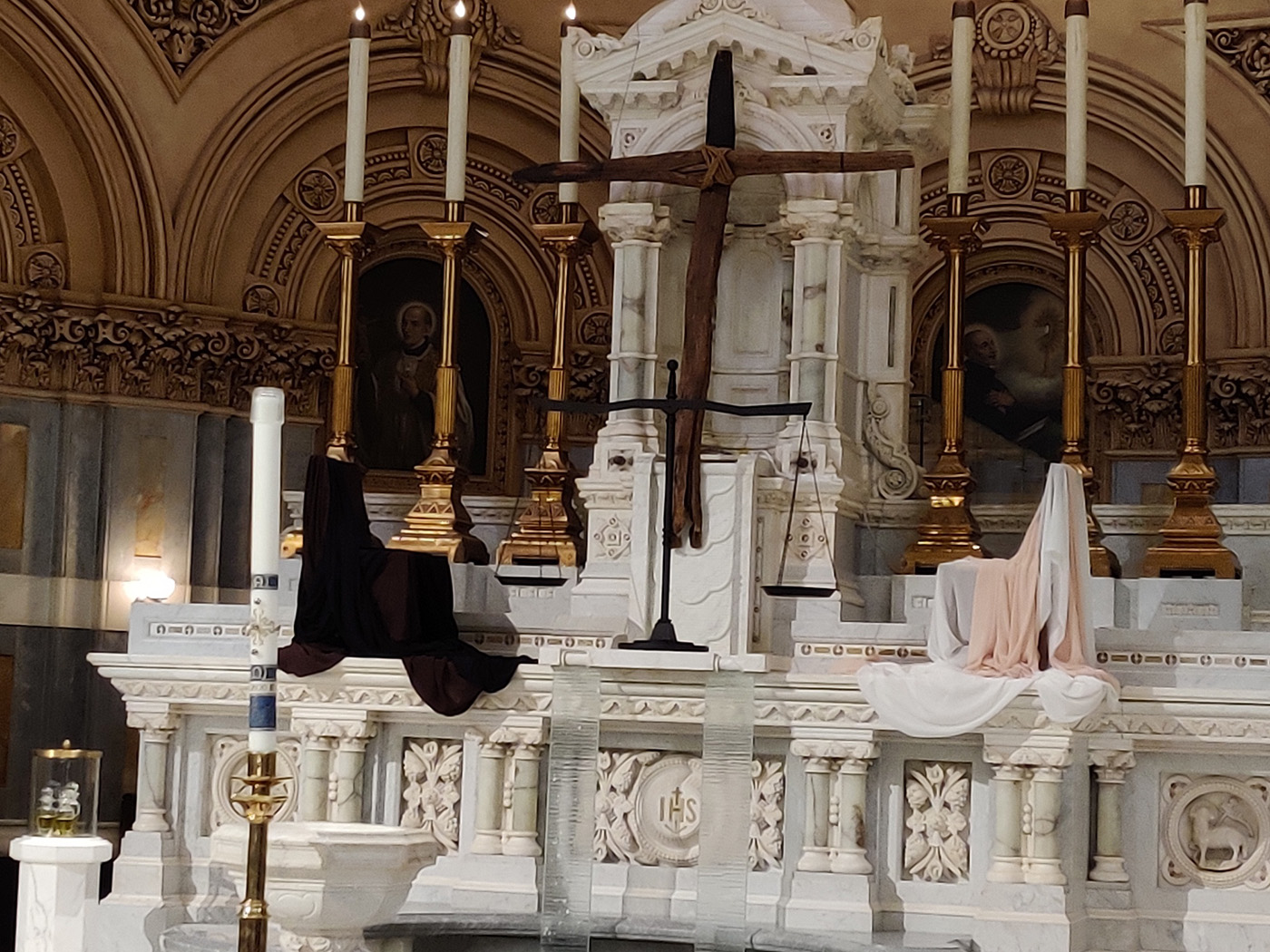
Lent 2021 art installation at St. Francis Xavier Church in Manhattan
It is probably safe to say that no one remains untouched by the sin of racism. It touches nearly all segments of every society across the world. To quote Father Bryan Massingale, “The wounds of racism are real and deep, but healing is possible.”
I truly want to believe that healing is possible! Amidst the annual commemoration of Black History Month, and as we journey toward Lent, I find my heart turning toward Isaiah, who calls us to “loose the bonds of injustice … [and] to let the oppressed go free. Then your light shall break forth like the dawn, and your healing shall spring up quickly” (Isaiah 58:6-8).
I’m under no illusions that the healing from racist wounds will “spring up quickly.” Still, it is possible when we engage the struggle together and commit to the necessary work of reconciliation, solidarity and justice. What might that look like?
I have to start with the fact that I am a person of privilege — a white, middle class professional with a good education and plenty of resources to live comfortably in a world where so many struggle to survive. At various times in my life, I have kept on my blinders of comfort and privilege. At other times, I have been hesitant to do anything — unsure or afraid of what to do. Regardless, I have too often dismissed the necessary work to foster healing and to commit to antiracism.
And yet, in recent years, I cannot forget the words of Bishop Edward Braxton, who in his 2015 pastoral letter on the racial divide, provides a starting point: “Faith in Christ, the redeemer of all people, urges us to overcome our hesitation.”
At this time last year, I walked into my parish on the first Sunday of Lent. Much to my surprise, clearly installed in the center of the sanctuary behind the altar was a large wooden cross, a balance scale, and two flanking chairs, one draped in black and the other in white. This Lenten focus put St. Francis Xavier Parish’s year-long theme of “Racial Justice: Exploring Racism and White Privilege” front and center and invited our faith community to contemplate:
What does sacrifice mean to me?
How do I understand racial justice and equity?
Where do I sit in a society of us versus them, of privilege and lack thereof?
What does this look like in my immediate life?
What does reconciliation and conversion mean to me?
What more can I do?
What does Jesus’s example teach me as we strive for racial justice?
The installation was at the same time alarming yet disarming, challenging yet inviting, discomforting yet intriguing. During the season of Lent, the point of the installation could not be dismissed: No more hesitancy!
Christ invites us to sit, facing each other, and enter into courageous and spiritual conversations marked by deep listening. Christ also invites us to see how the scale is imbalanced. The failure to acknowledge systemic and cultural roots of racism in the U.S. is a clear example of what many with privilege choose to ignore. We need to be alarmed, challenged and discomforted by this reality.
This work of art proved rather poignant for me. I have learned at least one thing in my four years at Maryknoll: In unique ways, the communities who receive our missioners invite us to sit face-to-face and do nothing else but first listen.
Listening to each other — sharing our stories — gradually opens eyes that did not notice, ears that misunderstood the groans of the world, and hearts that were overwhelmed or locked with fear or fatigue. These spiritual conversations forge the path of trust needed to work alongside each other to dismantle racism, classism, sexism and other chains of injustice. In this mutual sharing of care for another, we begin to embody a Christ-empowered community of reconciling, transforming love.
Our world needs more examples like this. I am grateful to be part of a community that strives — albeit imperfectly, but nonetheless with integrity — to uphold these ideals.
In the remainder of this Black History Month and during the Lenten journey ahead of us, I am challenged to ask the Spirit to help me let go of whatever gives rise to my hesitancy to confront racism. Whose stories do I need to listen to? How might I re-examine history and current events through the lens of individuals and communities whose experience has not been taken seriously? Will I ask for the grace and strength to remove my biases and stereotypes that oppress some while privileging others? For what guidance do I need to pray to better understand the hopes and fears of each cultural family here and around the world?
Your questions and prayer will be unique to your situation and experience of life. No matter the situation, let us help each other find a seat in the sanctuary in which we face another with love and respect.
Let us ask the Spirit to guide us to the face-to-face conversations we most need to have. To contemplate. To pray. To listen. To walk the Lenten journey with Jesus, each other, and all the people of God’s most holy chosen family.

